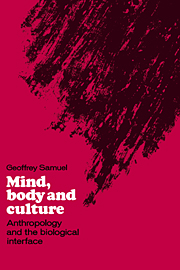Book contents
- Frontmatter
- Contents
- Preface
- 1 New paradigms and modal states
- 2 A natural science of society
- 3 Starting points I
- 4 Starting points II
- 5 Interpreting the flow
- 6 The multimodal framework
- 7 The Ndembu modal state repertoire
- 8 Sociocentric modal states
- 9 Shamanic mechanisms
- 10 The growth of the clerical approach
- 11 Technical and transformational mechanisms
- 12 Mind, body and culture
- Notes
- References
- Index
1 - New paradigms and modal states
Published online by Cambridge University Press: 04 September 2009
- Frontmatter
- Contents
- Preface
- 1 New paradigms and modal states
- 2 A natural science of society
- 3 Starting points I
- 4 Starting points II
- 5 Interpreting the flow
- 6 The multimodal framework
- 7 The Ndembu modal state repertoire
- 8 Sociocentric modal states
- 9 Shamanic mechanisms
- 10 The growth of the clerical approach
- 11 Technical and transformational mechanisms
- 12 Mind, body and culture
- Notes
- References
- Index
Summary
The idea of scientific paradigms came to the attention of the social sciences in the late 1960s. Thomas Kuhn's suggestion was that scientific knowledge in a particular area at any one time was limited and structured by its basic theoretical framework (‘paradigm’) and that scientific revolutions, as in the case of those associated with Galileo and Newton in the seventeenth century, and with Einstein, Heisenberg, Schrödinger and others in the late nineteenth and twentieth centuries, involved the replacement of one ‘paradigm’ by another (Kuhn 1970).
Ironically, Kuhn seems to have regarded the social sciences as never having achieved their first proper paradigm (cf. Kuhn 1970: 15). However, as Nick Perry has noted, the concept of the paradigm was immediately attractive to social scientists (Perry 1977). Anthropologists and sociologists soon decided that their fields of study already had a number of fully fledged ‘paradigms’ (such as functionalism, conflict theory, culture-and-personality and social interactionism). A corollary was the tantalizing idea of a new paradigm that might resolve many of the difficulties within the social sciences and provide a needed source of revitalization.
More recently, the growth of significant new approaches in the physical sciences, such as those of David Bohm and Ilya Prigogine (e.g. Bohm 1981, Factor 1985, Hiley and Peat 1987, Prigogine 1980), in psychology (Pribram 1971, 1984) and in evolutionary theory (e.g. Maturana and Varela 1980) have encouraged suggestions that equally radical transformations might be possible and appropriate in the social sciences (e.g. Loye et al. 1986, Brown 1988).
- Type
- Chapter
- Information
- Mind, Body and CultureAnthropology and the Biological Interface, pp. 1 - 16Publisher: Cambridge University PressPrint publication year: 1990



